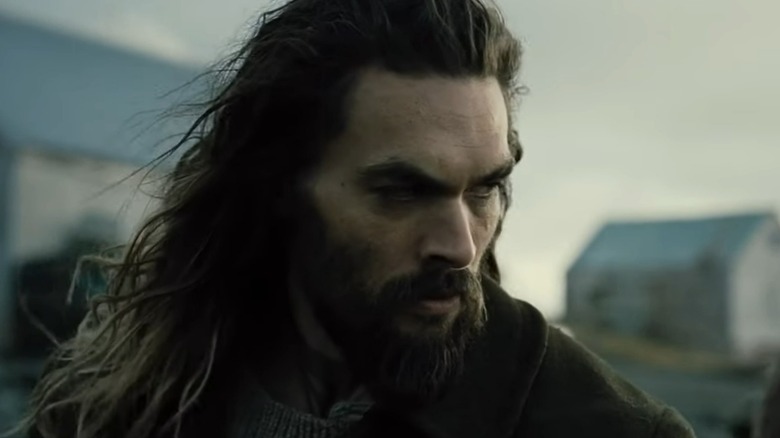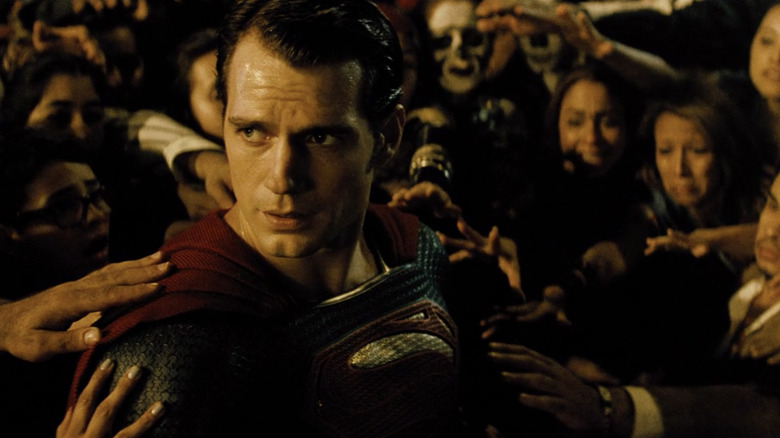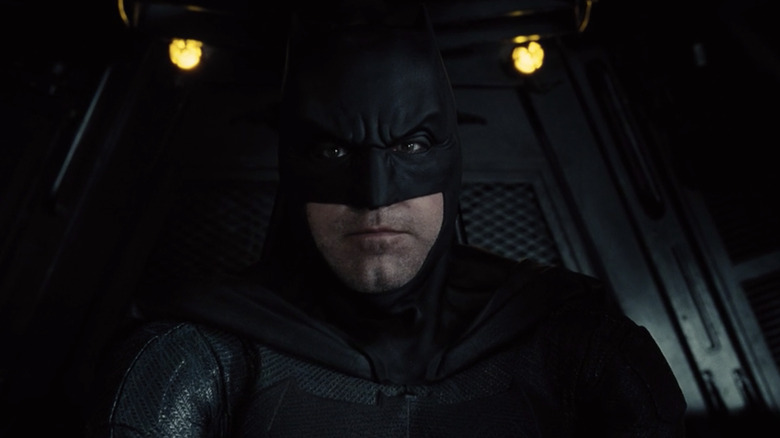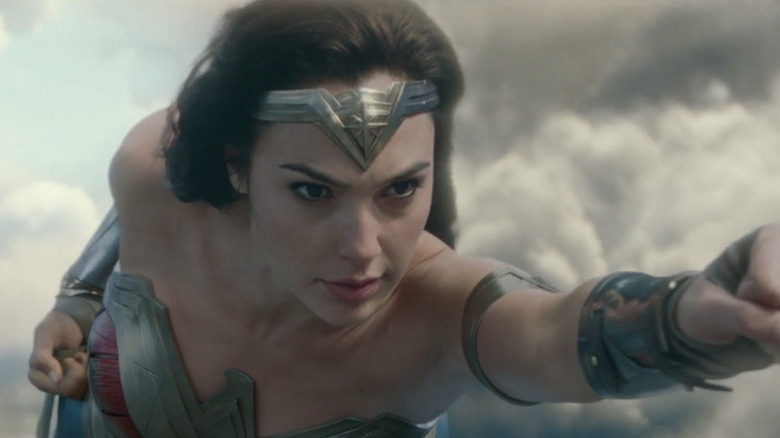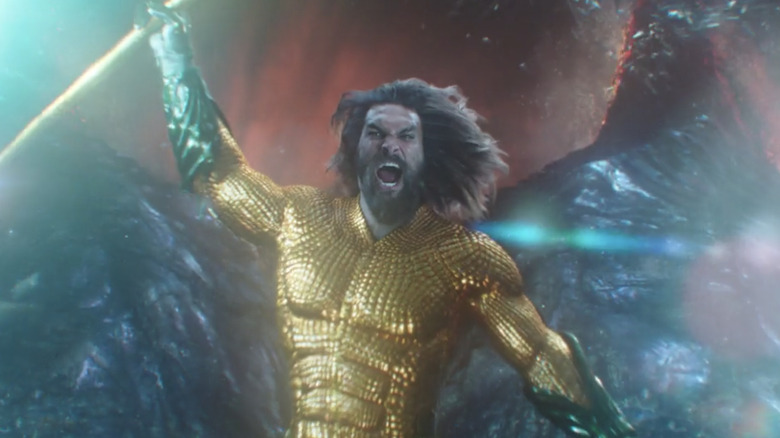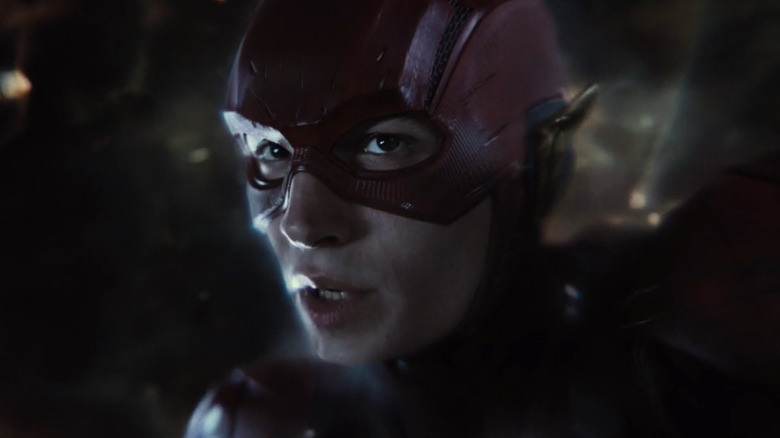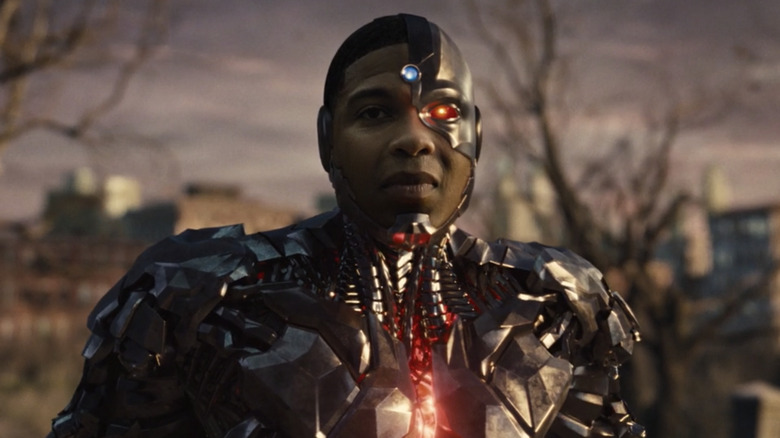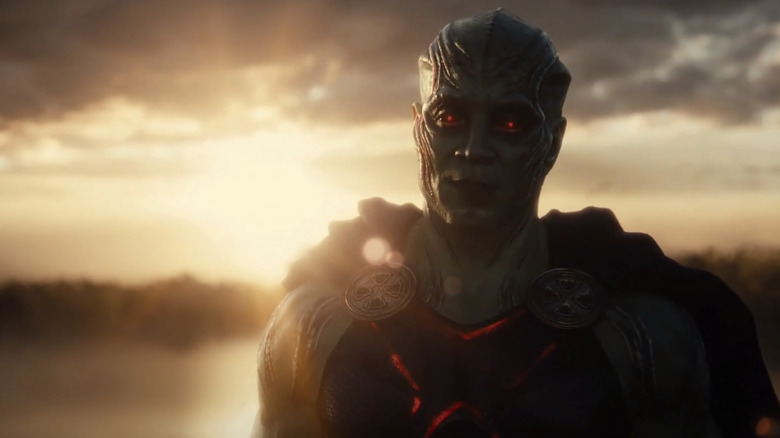The Biggest Weakness Of Every Member Of Snyder's Justice League Explained
There's no doubt that, over the course of Warner Brothers' attempts to launch a cinematic universe of DC Comics characters, it's gotten a little chaotic. With the departure of Zack Snyder and all the controversy surrounding Joss Whedon's version of "Justice League," many fans thought that they'd never get to see Snyder's superhero epic the way he'd intended it to be seen. Thankfully, the 2017 variant wasn't the last we saw of the world's greatest heroes. "Aquaman" and "Wonder Woman" allowed two of our favorite Justice Leaguers to shine, with multiple sequels in the work to continue their stories. Even Ezra Miller's version of The Flash has made a few cameos in shows like "Peacemaker" and "The Flash."
Regardless of what you might think of the current state of the DCEU, it's clear that "Zack Snyder's Justice League" is the vastly superior version of the film, reminding us that the original vision behind DC cinematic universe was a lot more compelling than given credit for. Snyder's version of the Justice League, consisting of Superman, Batman, Wonder Woman, The Flash, Aquaman, and Cyborg (with some hints that Martian Manhunter and the John Stewart incarnation of Green Lantern might've joined in the future), is by far the most powerful superhero team put to film. But even the world's greatest heroes have their own weaknesses ...
Superman can be killed by Kryptonite
Henry Cavill's first outing as Superman, "Man of Steel" tested Clark Kent's limits. He learned to develop and use his powers masterfully, fought against an alien military, and defeated General Zod in the only way he could (a decision that haunted him afterwards). The first film didn't have a lot of time to expand on Superman's weaknesses, so that was left for the sequel. In "Batman V Superman: Dawn of Justice," it's revealed that radioactive fragments of Krypton can weaken, harm, and even kill the Man of Steel; it's basically the only thing that can. After a brawl between the world's finest heroes, they eventually team-up against Lex Luthor, who unleashes a Kryptonian monster known as Doomsday on the city of Metropolis.
As Superman, Batman, and Wonder Woman battle the creature, Clark sacrifices himself by plunging Batman's Kryptonite spear into the monster's heart. Unfortunately, weakened by the poisonous rock, Doomsday still manages Superman. While the end of the film hints at Superman's possible return, it isn't until "Zack Snyder's Justice League" that the Man of Tomorrow is restored to life via a combination of Kryptonian tech, the Flash's Speed Force connection, and Cyborg's Mother Box, and even then it takes a minute for Supes to regain his full memory. It should also be noted that magic can harm Superman as well (Diana's golden lasso actually restrains him for a bit), but so far only Kryptonite has weakened Superman enough to kill him.
The death of Batman's parents cripple him to this day
We all know the story, it's been retold in just about every Batman medium since the character was created. After the deaths of his parents, Bruce Wayne (played by Ben Affleck in these films) traveled the globe to train with some of the world's most talented fighters. He developed a set of skills that allowed him to protect Gotham City for decades before Superman's arrival. "Batman V Superman" even alludes to the Joker having killed Robin and, because of that, Batman got even tougher on crime. When Superman showed up and fought Zod on the streets of Metropolis, Bruce witnessed the chaos and vowed to defeat the Last Son of Krypton before he destroyed the planet.
Armed with a mech-suit and a Kryptonite spear, Batman defeated Superman, but before the final blow, the Man of Steel pled with the Dark Knight to save his own mother: Martha. While Batman keeps his identity a secret from his enemies (except Lex Luthor), Superman's Daily Planet-based alter ego was able to uncover his identity as Bruce Wayne. This triggered a flashback to Bruce's own trauma, and allowed him to recognize Clark as having equal value as a not-so-human being and a superhero. To this day, the loss of Bruce's parents haunts him (watch the end of the Snyder Cut again) and is why he wears the cape and cowl, so that no one else would have to witness what he did that fateful night.
Wonder Woman can be overcome by love
After first appearing in "Batman V Superman: Dawn of Justice" to help Superman and Batman in battle against Doomsday, Diana Prince aka Wonder Woman got her own origin story in her own self-titled film set during the first World War. "Wonder Woman" shows her life on Themyscira, the Paradise Island of the Ancient Amazons, where she learned to fight and use her abilities in combat. When an American pilot named Steve Trevor crash-landed on the island, Diana felt a responsibility to help the world, believing that the god Ares was responsible. In the process, she fell in love with Trevor, though he tragically died saving countless lives, inspiring her to defeat Ares.
While most wouldn't see love as a weakness (and in truth, it isn't), it can often blind us from the realities of the world, and even from right and wrong. In her own sequel, "Wonder Woman 1984," Steve is returned to life after Diana makes a wish, just not in his own body. Diana's love for Steve blinds her to the reality that the wish isn't real and that it's continually weakening her, keeping her from defeating both the Cheetah and Maxwell Lord in battle. Although she fights against revoking her wish, Steve once again manages to convince her that it's the only way, and she restores balance to the world. Losing Steve twice made Diana turn her back on the world, at least until "Dawn of Justice."
Aquaman needs water to replenish his abilities
One of the most powerful superheroes out there (even if he is often the butt of the joke), Arthur Curry aka Aquaman is a half-human/half-Atlantean hybrid who also has some extra-special royal blood pumping through his veins. While Arthur is probably stronger in water than on dry land, that doesn't stop him from taking out countless Parademons, contributing to Steppenwolf's defeat, or battling Black Manta. A hero and a king, Arthur is a man of two very different worlds, and that makes him all the more interesting. Even if his interests between the seas and the surface are sometimes divided, Aquaman remains a hero no matter the circumstance.
But "Aquaman" makes it clear that when Arthur is away from the water for too long, his powers begin to deplete. In fact, the longer he strays from it, like every human being, the weaker he gets. Of course, Aquaman isn't a normal human being, so that means it might even be a bit worse for him since his part-Atlantean physiology would need water even more than we do. While Arthur doesn't allow this to happen too often, it can be an occasional danger — especially when he's on mission in the middle of the desert. It's not quite as bad as Kryptonite is for Superman, but there's no doubt that dehydration is probably Aquaman's greatest weakness.
The Flash doesn't know the scope of his abilities
After a quick cameo in "Batman V Superman: Dawn of Justice," and another in "Suicide Squad," Barry Allen aka The Flash made his heroic debut in 2017's "Justice League." While the theatrical cut of "Justice League" didn't touch much on the Flash's history or power-set, the Snyder Cut manages to do both exceedingly well. We see that not only does the Flash have super-speeding abilities, but his connection to the Speed Force helps in resurrecting Superman from the dead. It can even allow him to reverse time, stopping Darkseid from destroying the planet. As one of the most powerful metahumans on the planet, the Flash might be one of the most underrated members of the Justice League.
"Zack Snyder's Justice League" makes it abundantly clear that Barry doesn't quite know the scope of his abilities. In the Whedon cut of the film, he's often crippled by fear, unsure how to be a hero. As Batman encourages him to save just one person, the Flash quickly focuses on the task at hand, even if he still struggles with his own abilities. In Snyder's version, Flash's greatest weakness isn't a radioactive rock or a lack of water, but rather his inexperience. (Well, that and his clumsiness, which is a huge issue for him.) As Barry continues to develop his powers, they leaves him with a lot more questions than answers. Hopefully "The Flash" film will eventually explain them a bit more.
Cyborg struggles to maintain his humanity
There's no doubt that "Zack Snyder's Justice League" did wonders to improve on the original story, but out of every character who got a massive face-lift, no one benefited more from the Snyder Cut than Victor Stone aka Cyborg. Cyborg had been tossed aside by Whedon's version of the film, but with Snyder back at the helm, there was a lot more depth and development added to the character — all of which made him both more interesting and relatable. His struggle to deal with his new circumstances, and his anger towards his father, became a huge part of his own hero's journey, and overcoming these trials only make him a more invaluable asset to the Justice League.
According to Ray Fischer (per Christian Today), "[Cyborg's] greatest weakness is actually trying not to succumb to the technology. Trying to stay human." The first half of "Justice League" is hard on Victor, because he believes he isn't even really human anymore. In fact, Victor nearly loses himself in his machine half before recognizing his potential as a hero. As Cyborg, Victor's biggest struggle is and forever will be the balance between using his cybernetic abilities for good and maintaining his human emotions in the process. This is something his comics-counterpart has worked through for years, with his machine side manifesting as the supervillain known only as Grid.
Martian Manhunter let fear keep him from being a hero
Okay, so the version of Martian Manhunter that we encounter in "Zack Snyder's Justice League" isn't exactly a member of the team, at least not for the majority of the movie, but his final scene with Batman makes it seem like he considers himself a part of it going forward. Since they both believe that Darkseid will return, there's no doubt that a new partnership has formed. While the Manhunter from Mars only appears in his true martian form in the Snyder Cut, he first appeared as Secretary of Defense Calvin Swanwick in 2013's "Man of Steel." Since then, he also appeared briefly in "Batman V Superman: Dawn of Justice" before finally revealing himself as J'onn J'onzz.
Traditionally, Martian Manhunter has an aversion to fire, a common weakness that he shares with his own people, but there is no such indication in Snyder's films. Rather, the Martian Manhunter's greatest weakness in Snyder's world is that his fear to kept him from saving the world sooner. J'onn J'onzz stood by when the world was in danger three different times — first from General Zod and his army of Kryptonians, second when Lex Luthor unleashed Doomsday on Metropolis, and lastly during Steppenwolf's invasion. While the second is excusable, there's no excuse for why he didn't come to Superman's aid on the other two occasions. The only possible explanation is fear, but thankfully, they're fears he seems to have overcome.
